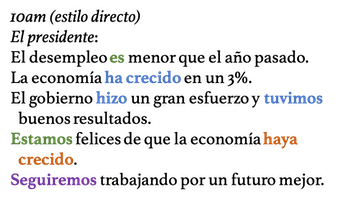64. Reported Speech: Use of the Pluperfect
- Page ID
- 16268
\( \newcommand{\vecs}[1]{\overset { \scriptstyle \rightharpoonup} {\mathbf{#1}} } \)
\( \newcommand{\vecd}[1]{\overset{-\!-\!\rightharpoonup}{\vphantom{a}\smash {#1}}} \)
\( \newcommand{\dsum}{\displaystyle\sum\limits} \)
\( \newcommand{\dint}{\displaystyle\int\limits} \)
\( \newcommand{\dlim}{\displaystyle\lim\limits} \)
\( \newcommand{\id}{\mathrm{id}}\) \( \newcommand{\Span}{\mathrm{span}}\)
( \newcommand{\kernel}{\mathrm{null}\,}\) \( \newcommand{\range}{\mathrm{range}\,}\)
\( \newcommand{\RealPart}{\mathrm{Re}}\) \( \newcommand{\ImaginaryPart}{\mathrm{Im}}\)
\( \newcommand{\Argument}{\mathrm{Arg}}\) \( \newcommand{\norm}[1]{\| #1 \|}\)
\( \newcommand{\inner}[2]{\langle #1, #2 \rangle}\)
\( \newcommand{\Span}{\mathrm{span}}\)
\( \newcommand{\id}{\mathrm{id}}\)
\( \newcommand{\Span}{\mathrm{span}}\)
\( \newcommand{\kernel}{\mathrm{null}\,}\)
\( \newcommand{\range}{\mathrm{range}\,}\)
\( \newcommand{\RealPart}{\mathrm{Re}}\)
\( \newcommand{\ImaginaryPart}{\mathrm{Im}}\)
\( \newcommand{\Argument}{\mathrm{Arg}}\)
\( \newcommand{\norm}[1]{\| #1 \|}\)
\( \newcommand{\inner}[2]{\langle #1, #2 \rangle}\)
\( \newcommand{\Span}{\mathrm{span}}\) \( \newcommand{\AA}{\unicode[.8,0]{x212B}}\)
\( \newcommand{\vectorA}[1]{\vec{#1}} % arrow\)
\( \newcommand{\vectorAt}[1]{\vec{\text{#1}}} % arrow\)
\( \newcommand{\vectorB}[1]{\overset { \scriptstyle \rightharpoonup} {\mathbf{#1}} } \)
\( \newcommand{\vectorC}[1]{\textbf{#1}} \)
\( \newcommand{\vectorD}[1]{\overrightarrow{#1}} \)
\( \newcommand{\vectorDt}[1]{\overrightarrow{\text{#1}}} \)
\( \newcommand{\vectE}[1]{\overset{-\!-\!\rightharpoonup}{\vphantom{a}\smash{\mathbf {#1}}}} \)
\( \newcommand{\vecs}[1]{\overset { \scriptstyle \rightharpoonup} {\mathbf{#1}} } \)
\(\newcommand{\longvect}{\overrightarrow}\)
\( \newcommand{\vecd}[1]{\overset{-\!-\!\rightharpoonup}{\vphantom{a}\smash {#1}}} \)
\(\newcommand{\avec}{\mathbf a}\) \(\newcommand{\bvec}{\mathbf b}\) \(\newcommand{\cvec}{\mathbf c}\) \(\newcommand{\dvec}{\mathbf d}\) \(\newcommand{\dtil}{\widetilde{\mathbf d}}\) \(\newcommand{\evec}{\mathbf e}\) \(\newcommand{\fvec}{\mathbf f}\) \(\newcommand{\nvec}{\mathbf n}\) \(\newcommand{\pvec}{\mathbf p}\) \(\newcommand{\qvec}{\mathbf q}\) \(\newcommand{\svec}{\mathbf s}\) \(\newcommand{\tvec}{\mathbf t}\) \(\newcommand{\uvec}{\mathbf u}\) \(\newcommand{\vvec}{\mathbf v}\) \(\newcommand{\wvec}{\mathbf w}\) \(\newcommand{\xvec}{\mathbf x}\) \(\newcommand{\yvec}{\mathbf y}\) \(\newcommand{\zvec}{\mathbf z}\) \(\newcommand{\rvec}{\mathbf r}\) \(\newcommand{\mvec}{\mathbf m}\) \(\newcommand{\zerovec}{\mathbf 0}\) \(\newcommand{\onevec}{\mathbf 1}\) \(\newcommand{\real}{\mathbb R}\) \(\newcommand{\twovec}[2]{\left[\begin{array}{r}#1 \\ #2 \end{array}\right]}\) \(\newcommand{\ctwovec}[2]{\left[\begin{array}{c}#1 \\ #2 \end{array}\right]}\) \(\newcommand{\threevec}[3]{\left[\begin{array}{r}#1 \\ #2 \\ #3 \end{array}\right]}\) \(\newcommand{\cthreevec}[3]{\left[\begin{array}{c}#1 \\ #2 \\ #3 \end{array}\right]}\) \(\newcommand{\fourvec}[4]{\left[\begin{array}{r}#1 \\ #2 \\ #3 \\ #4 \end{array}\right]}\) \(\newcommand{\cfourvec}[4]{\left[\begin{array}{c}#1 \\ #2 \\ #3 \\ #4 \end{array}\right]}\) \(\newcommand{\fivevec}[5]{\left[\begin{array}{r}#1 \\ #2 \\ #3 \\ #4 \\ #5 \\ \end{array}\right]}\) \(\newcommand{\cfivevec}[5]{\left[\begin{array}{c}#1 \\ #2 \\ #3 \\ #4 \\ #5 \\ \end{array}\right]}\) \(\newcommand{\mattwo}[4]{\left[\begin{array}{rr}#1 \amp #2 \\ #3 \amp #4 \\ \end{array}\right]}\) \(\newcommand{\laspan}[1]{\text{Span}\{#1\}}\) \(\newcommand{\bcal}{\cal B}\) \(\newcommand{\ccal}{\cal C}\) \(\newcommand{\scal}{\cal S}\) \(\newcommand{\wcal}{\cal W}\) \(\newcommand{\ecal}{\cal E}\) \(\newcommand{\coords}[2]{\left\{#1\right\}_{#2}}\) \(\newcommand{\gray}[1]{\color{gray}{#1}}\) \(\newcommand{\lgray}[1]{\color{lightgray}{#1}}\) \(\newcommand{\rank}{\operatorname{rank}}\) \(\newcommand{\row}{\text{Row}}\) \(\newcommand{\col}{\text{Col}}\) \(\renewcommand{\row}{\text{Row}}\) \(\newcommand{\nul}{\text{Nul}}\) \(\newcommand{\var}{\text{Var}}\) \(\newcommand{\corr}{\text{corr}}\) \(\newcommand{\len}[1]{\left|#1\right|}\) \(\newcommand{\bbar}{\overline{\bvec}}\) \(\newcommand{\bhat}{\widehat{\bvec}}\) \(\newcommand{\bperp}{\bvec^\perp}\) \(\newcommand{\xhat}{\widehat{\xvec}}\) \(\newcommand{\vhat}{\widehat{\vvec}}\) \(\newcommand{\uhat}{\widehat{\uvec}}\) \(\newcommand{\what}{\widehat{\wvec}}\) \(\newcommand{\Sighat}{\widehat{\Sigma}}\) \(\newcommand{\lt}{<}\) \(\newcommand{\gt}{>}\) \(\newcommand{\amp}{&}\) \(\definecolor{fillinmathshade}{gray}{0.9}\)  |
  |
presente → imperfecto
| • Para contar en tiempo pasado lo que alguien dijo originalmente en presente (hechos no terminados en el momento actual), se emplea el imperfecto (hechos no terminados durante el pasado: situaciones continuas, descripción de circunstancias, intenciones, hábitos, acciones en progreso; §39): Vivo en La Paz. → Dijo que vivía en La Paz. (situación continua) Tengo veinte años. → Me contó que tenía veinte años. (descripción) Quiero estudiar. → Dijo que quería estudiar. (intención) Leo todos los días. → Me explicó que leía todos los días. (hábito) Ahora voy hacia mi casa. → Afirmó que iba hacia su casa. (acción en progreso) Vamos a esperar hasta que ella llegue. → Dijeron que iban a esperar hasta que ella llegara. (intención) Si la declaración original estaba en imperfecto, este se mantiene: Nunca comíamos en casa. → Dijo que nunca comían en casa. (hábito) |
• When reporting in the past tense what someone originally said in the present (incomplete current events), the imperfect is used (incomplete events during the past: ongoing conditions, description of circumstances, intentions, habits, actions in progress; see §39). I live in La Paz. → He said he lived in La Paz. (ongoing condition) I am twenty. → He told me he was twenty. (description) I want to study. → He said he wanted to study. (intention) I read every day. → He explained that he used to read every day. (habit) Now I am heading home. → He declared he was heading home. (action in progress) We are going to wait until she arrives. → They said they were going to wait until she arrived. (intention) If the original statement was in the imperfect, keep it: We never ate at home. → He said they never ate at home. (habit) |
pretérito → pluscuamperfecto
| • Para contar en tiempo pasado lo que alguien dijo originalmente en pretérito (hechos ya completados: §35), se emplea el pluscuamperfecto (descripción en pasado de un evento previo): Nací en La Paz. → Dijo que había nacido en La Paz. Tuve que emigrar. → Me contó que había tenido que emigrar. Regresé ayer. → Dijo que había regresado el día anterior. Estoy feliz de que hayas regresado. → Dijo que estaba feliz de que hubieras regresado. |
• When reporting in the past tense what someone originally said in the preterite (complete past events: see §35), the pluperfect is used (past description of a previous occurrence). I was born in La Paz. → He said he had been born in La Paz. I had to emigrate. → He told me he had had to emigrate. I came back yesterday. → He said he had come back the previous day. I am happy that you came back. → He said he was happy that you had come back. |
| • Combinando ambos casos: Nací en La Paz y ahora vivo en Sucre. → Explicó que había nacido en La Paz y que ahora vivía en Sucre. Me fui cuando tenía quince años y ahora tengo veinte. → Afirmó que se había ido cuando tenía quince años y que ya tenía veinte. Quise regresar hace dos años pero no fue posible. → Dijo que había querido regresar hacía dos años pero que no había sido posible. Es raro que ella no me haya dicho nada sobre lo que pasó. → Dijo que era raro que ella no le hubiera dicho nada sobre lo que había pasado. |
|
| ♦ Unlike colloquial English, in this context the pluperfect is widely used in Spanish. Compare: Dijeron que se habían divertido mucho. ≠ They said they had a great time (they had had a great time). Me contó que había visitado a la familia. ≠ He told me he visited his family (he had visited his family). |
futuro → condicional
| • Para contar en tiempo pasado lo que alguien dijo originalmente en futuro, se emplea el condicional (§60): Iré a La Paz. → Dijo que iría a La Paz. Tendré que emigrar. → Me contó que tendría que emigrar. Habré regresado para esa fecha. → Dijo que habría regresado para esa fecha. |
• When reporting in the past tense what someone originally said in the future (§60): I will go to La Paz. → He said he would go to La Paz. I will have to emigrate. → He told me he would have to emigrate. I will have come back by that date. → He said he would have come back by that date. |
¡A practicar!
Complete con la forma verbal adecuada. [Ejercicio interactivo] (Diccionario)
Modelo: No sé por qué llegaron tarde. Les preguntaré. → Dijo que no sabía por qué habían llegado tarde y que les preguntaría .
1. Trabajo para una compañía que fue creada hace un año. →
Dijo que __________ para una compañía que __________ creada __________ un año.
2. Seguiré trabajando en esa empresa hasta que encuentre algo mejor. →
Dijo que __________ trabajando en esa empresa hasta que __________ algo mejor.
3. Vamos a tener en cuenta la propuesta, pero nuestro gobierno ha implementado otro plan. →
Dijeron que __________ a tener en cuenta la propuesta, pero que su gobierno __________ otro plan.
4. Hace frío y por eso no me atreví a meterme en la piscina, pero mañana sí nadaré. →
Dijo que __________ frío y que por eso no __________ a meterse en la piscina, pero que al día siguiente sí __________.
5. Los dinosaurios se extinguieron desde hace muchos años y es tonto que pienses en ellos ahora. →
Dijo que los dinosaurios __________ desde __________ muchos años y que __________ tonto que yo __________ en ellos ahora.
6. Estuvimos allí dos semanas y nos divertimos muchísimo, pero estamos felices de haber regresado. →
Dijo que ellos __________ allí dos semanas y que __________ muchísimo, pero que __________ felices de haber regresado.
7. Antes vivía en La Paz, pero emigré para buscar otro empleo. No sé si tendré éxito. →
Dijo que antes __________ en La Paz, pero que __________ para buscar otro empleo. Dijo que no __________ si __________ éxito.
8. Es normal que te hayas puesto nervioso con el examen porque el tema era bastante complejo. →
Dijo que __________ normal que yo __________ nervioso con el examen porque el tema __________ bastante complejo.
- Traducción al inglés
- 1) He said he worked for a company that had been created a year earlier. 2) She said she would keep working in that company until she found something better. 3) They said they were going to take the proposal into account, but that their government had implemented another plan. 4) He said it was cold and for that reason he didn't dare getting in the pool, but that the next day he would definitely swim. 5) He said dinosaurs had been extinguished many years before and that it was silly for me to think about them now. 6) She said they had been there for two weeks and that they had a lot of fun, but that they were happy to be back. 7) He said he used to live in La Paz (before), but that he had emigrated to find another job. He said he didn't know if he'd succeed. 8) He said it was normal that I had gotten nervous about the exam because the topic was quite complex.
- Respuestas
- 1) trabajaba - había sido - hacía 2) seguiría - encontrara 3) iban - había implementado 4) hacía - se había atrevido - nadaría 5) se habían extinguido - hacía - era - pensara 6) habían estado - se habían divertido - estaban 7) vivía - había emigrado - sabía - tendría 8) era - me hubiera puesto - era


